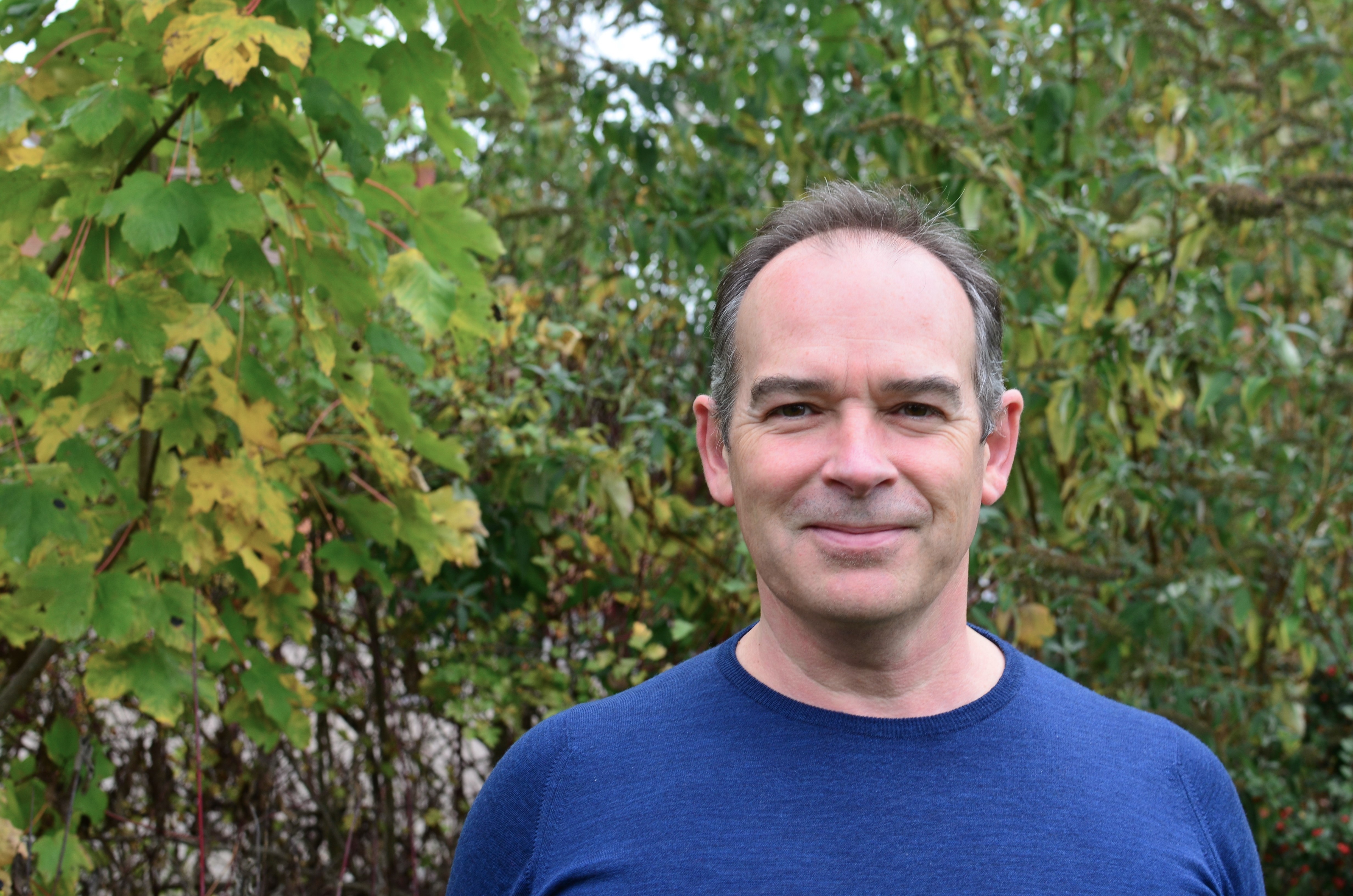
BY DAVID GRIFFITHS
I wish I didn’t feel the need to write this article…
At heart, I’m a back-to-nature, live-off-the-land kind of guy who loves the feeling of living in harmony with the beautiful planet that we have inherited
The idea that our diet doesn’t provide all that it needs to for good health in the 21st century is something that I struggle with, but being around the health and fitness industry for 20 years has led me to certain inescapable conclusions which I’ll explore here. You obviously don’t have to reach the same conclusions as I have but I believe that unless we are specifically educated in this area we are at the mercy of newspaper headlines and to some extent the interests of big business to look after our health. I’m afraid it is undoubtedly true that the person who cares most about your health is you; not the media nor giant corporations. It is our personal responsibility to take a proactive approach to our health and not to assume that all is well, and if and when it goes wrong there will be a magic pill to fix it.
If you look at my health pyramid below, you’ll see how in almost all of the areas shown, we have dramatically changed how we live, sleep, eat, exercise and interact…. and this change has happened in a miniscule snapshot of our human evolution. Some of the things a few decades ago we were talking about as progress, we are beginning to think of as short-sighted at best and hugely destructive at worst.
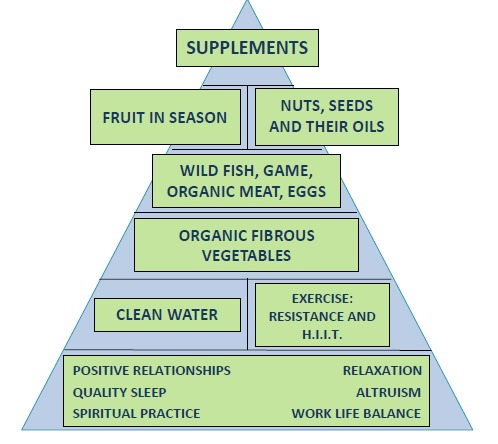
In our time-starved society the blue light from our devices blunts the release of melatonin and disrupts our sleep cycles; we often have precious little ‘me time’; many of us don’t make time for exercise; we engage in questionable ways of rearing farm animals and growing crops; and the proportion of food choices that we could have picked, grown and generally found in nature is diminishing. Most of these changes have happened in the last 100 years of our 2-million-year evolution as humans.
So, we are told we are living longer. This is pretty much a myth based on AVERAGE (i.e. mean) life expectancy. In biblical times the average life expectancy was around 30 but if you take one person who lives to 80 and a mother who dies in childbirth, you end up with a mean life expectancy of 100 divided by the 3 lives i.e. 33 years. But people were living to 80 or older back then just as we are now; our AVERAGE life expectancies now are largely a reflection of factors like improvements in sanitation and the management of infectious disease.
The late 20th and 21st centuries are marked out in disease terms by a dramatic and sudden rise in what we term chronic degenerative disease. Our disease profiles are nothing like they were even 100 years ago.
Chronic degenerative disease is exactly what it says: it is a degenerative process that takes place usually over decades in an asymptomatic form until it manifests itself to an extent where it compromises our function or suddenly kills us. It manifests as heart disease, dementia, various cancers, type 2 diabetes, arthritis and a whole host of debilitating conditions. While we may have a genetic predisposition to a condition, eminent epidemiologists like Walter Willett at Harvard have shown that these are very largely diseases of lifestyle and nutrition, not genetics. The relatively new science of epigenetics is showing even more clearly how it’s largely not the genes we are born with but which genes we turn on and express which determine our fate. As the phrase has it, genetics loads the gun and lifestyle pulls the trigger.
So where does the controversial subject of supplements fit into this?
Firstly, like everything else, our nutrition has changed out of all proportion to how we evolved: paleobiologists estimate that we get a diet devoid of nutrients compared with our ancestors, as the chart below shows:
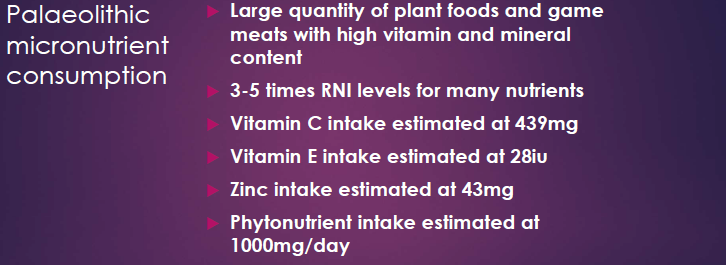
Note that many vitamins and minerals are 3 to 5 times higher than current guidelines (which many people don’t hit), and with all-important phytonutrients we may be getting a tenth or even less.
So we are not so much supplementing as making up for the shortfall.
Current nutritional guidelines were set from the 1940s and as our knowledge of human nutrition has grown, we have set reference guidelines for other nutrients. For instance, chromium, which we know especially in regard to its importance in insulin metabolism, didn’t have an RDA till 1989. But it is important to note that the remit of the RDAs is largely to set acute deficiency markers e.g. an acute deficiency of vitamin D would manifest itself as rickets. While we see very little rickets in our modern western communities, we do see vitamin D levels which trouble nutritionists and doctors as they are seen as a) suboptimal and b) inadequate when considered in the long term. What leading authorities of this pro-hormone see as optimum levels, few people would achieve through diet and sun exposure alone in the UK. It is similar for many nutrients: in fact one study done by the USDA in 1977-78 found that not one person in a 21,500 study group achieved RDA levels for 10 important nutrients. Our health is failing even though we are not genetically programmed for that to happen. One goal of the nutrition industry, as it should be for all of medicine, is to empower our bodies to resist disease and to live fully functional lives rather than spending our later years in relative morbidity.
The nutrition industry is still fairly young and only recently are we changing our minds about the way that antioxidants function as we start to unravel complex cellular signalling pathways and the role that certain nutrients have in instructing our cells to optimise various functions of repair, energy production, detoxification etc. The indiscriminate use of single (or limited combination) nutrients makes no sense and yet many people without better information will take, let’s say, a heap of vitamin E or calcium without understanding the complex reactions that the body performs to use these nutrients. This might be akin to knowing that avocados are good for us, therefore we choose a diet which prescribes 30 avocados and nothing else every day — clearly nonsense.
This is how complex our cellular interactions are:
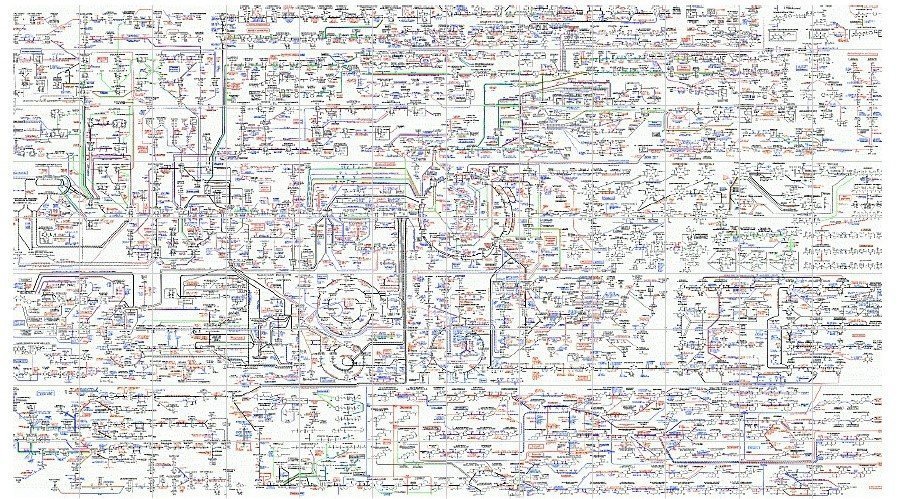
Each of those reactions depends on a vitamin, co-factor, amino acid or mineral to facilitate them — processes which enhance our cellular health, which in turn enhances the health of our tissues, organs and of course ultimately us. If we lack the micronutrients to synthesise those enzymes, we cannot run smoothly.
Unfortunately, the pharmaceutical “gold-standard” of research principally revolves around a placebo group (where everything stays the same) and the other group where ONE thing is changed. To apply that to nutrition, like the avocado analogy, is a non-viable model.
I would not trust my health to supplement companies unless their scientists have an intimate knowledge of the cellular processes above and a team of PhDs working at the cutting edge of the industry. Don’t play Russian Roulette with your health without acquiring some knowledge: I believe you can be at best doing no good, and at worst having a negative impact on your long-term health. The safety record of good quality supplements is absolutely impeccable and even if you lump in the bad quality ones more people are killed by car fresheners than vitamins; but the media love a bit of vitamin bashing, distorting statistics to make a headline. When you look closer, you’ll see the safety record of ‘conventional’ medications is nothing short of disgraceful: you would only have to Google “iatrogenic disease” to open that particular Pandora’s box, but I’ll save you the trouble.
The Lancet estimates that 88,000 people had premature heart attacks (of which 38,000 were fatal) as a side effect from just one arthritis drug. And yet there is a very clear and totally harmless nutritional protocol for arthritis involving weight loss, reduction of inflammation and oxidation of cartilage tissue, and boosting collagen and cartilage synthesis.
Another example revolves around the prescription of various medications to deal with the complications of diabetes type 2 and metabolic dysfunction, and yet this cluster of diseases is so clearly related to diet and lifestyle: so why is this advice playing second fiddle to pharmaceutical interventions? I’ll leave you to answer that particular rhetorical question!
So onto perhaps the greatest threat of the 21st century: dementia. As with many arthritis drugs, two of the leading drugs prescribed for dementia have been found to accelerate the progression of the disease, where vitamin E was found to slow it down by 19% against the placebo. But what are we being prescribed? Another rhetorical question! By the way, despite the fact that vitamin E emerges as a clear winner in this study, it is again ignoring fundamental nutritional principles: I believe we can do a lot better with a comprehensive rather than a single nutrient approach.
Lastly, I would emphasise again to proceed with caution when self prescribing vitamins — just because they are advertised on the TV or on the side of a bus does not guarantee effectiveness. Unfortunately, this area of expertise is not well covered by doctors yet — they generally receive around nine to twelve hours of nutritional training in a five-year medical degree. While I have the utmost respect for the work of these amazing people, I bet there aren’t many doctors who wouldn’t wish for a more comprehensive toolkit to answer the needs of their patients.
I am always available for a free discussion on this topic because firstly, it is a subject I am passionate about in many ways and secondly, I get a massive kick from being able to help people with their health when all else has failed. That is not to be taken as a guarantee by the way, though I have countless people who fall into that category. It’s actually a wonder why, given our nutritional deficiencies, that we do as well as we do. But wherever we are on our health continuum, we can always take a step in the wrong direction or a step in the right one.
If you’d like to get in touch, please just ping me a message using the form below.
Wishing you the very best on your health journey
David

3,000+ Olympic and elite athletes trust Usana supplements, which are certified by the NSF for use by athletes. Click here for up to 18% discount off the retail price for their high-potency vitamin and mineral formulation:
https://mywellspring.usana.com/ux/cart/#!/en-UK/product/101.050102

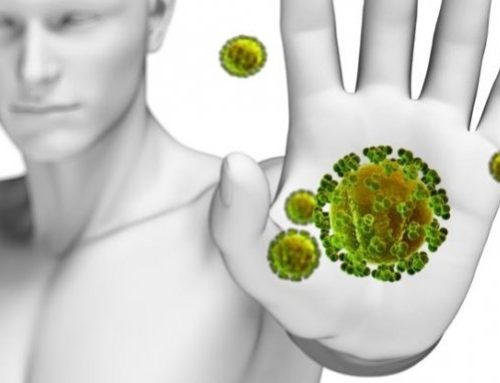


Leave A Comment